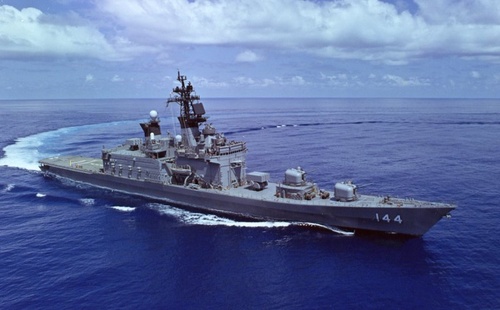October 10, 2007
Prime Minister Fukuda's honeymoon continues, as the newest numbers show that his cabinet's approval ratings went up slightly since he first took over form Abe. But then again he has had a pretty easy couple of weeks hus far, character after all is defined by how we handle adversity, not by how we handle normality. Fukuda can tkae comfort in the fact that the public is generally supportive of his position on the major issues facing Japan at the moment, now we get to see if he can turn that support and goodwill into results.
From the Yomuiri Shimbun: Fukuda Cabinet's approval rating at 59%
The Cabinet of Prime Minister Yasuo Fukuda has achieved the fourth-highest approval rating for a cabinet since surveys of new cabinets began in 1978, polling 59.1 percent approval and 26.7 percent disapproval, according to the findings of a nationwide Yomiuri Shimbun conducted Friday and Saturday.
Posted by: raging tachikoma at
02:12 AM
| No Comments
| Add Comment
Post contains 155 words, total size 1 kb.
Talking about military issues in Japanese politics is like trying to have a frank discussion about social security in the US, everyone knows the issue needs to be adressed yet no one really wants to risk the political backlash of changing the status quo. Largely this is the result of years of smeantic footwork to avoid and conceal the fact the Japanese government has long been in violation of Article nine of the Japanese constitution. See my previous thoughts on that issue here.
Exhibit 1: PM treads softly on collective self-defense issue.
From the Yomuiri Shimbun:
Prime Minister Yasuo Fukuda said Tuesday at the House of Representatives Budget Committee that the issue of the right to collective self-defense has to be handled "carefully," a departure from former Prime Minister Shinzo Abe's tendency to lean toward approving the use of the right."Sufficient discussions are necessary on what kind of international activities the Self-Defense Forces may exercise the right to collective self-defense in terms of the constitutional interpretation," he said.
Under the government's interpretation of the Constitution, Japan has the right of collective self-defense under international law, but may not exercise the right.
So we can have a military but we can not use it. If that is the case then why maintain a military at all? Everyone knows that this is utter bullshit but no mone has the stones enough to stand up and say so. If Japan is ever going to become a normal nation the continual self deluding, feel good semantic trickery needs to come to an end. Just as when the SDF was formed no one bought into the concept of a military witout military potential as it was described, I do not think anyone really believes the position that has been continuously put forward by the Japanese government, even by the current PM. For him it is simply an excuse to shoot down a proposal by the DPJ, one that he probably should have siezed and run with because, A) it would help to further normalize Japan militarily and B) because Ozawa probably figured that Fukuda would reject his offer. If he had agreed he could have shifted the playing field further toward normal than by only pursuing the current path, which is important and helpful, but why have just one piece of cake when the offer of two is on the table?
Exhibit 2:
From the Japan Times: Ozawa's Afghan gambit rejected.
Chief Cabinet Secretary Nobutaka Machimura on Tuesday rejected Democratic Party of Japan President Ichiro Ozawa's suggestion that Japan participate in NATO's International Security Assistance Force in Afghanistan.Afghanistan is "a very dangerous area and can be called a combat zone," Machimura said during a session of the House of Representatives Budget Committee.
"Based on the Constitution (which prohibits the use of force), we cannot support" Ozawa's opinion that Japan should participate in ISAF activities, he said.
The semantic confusion surrounding the SDF creates another problem, namely that it isn't entirely clear who has the final say regarding the conduct and scope of ongoing SDF missions. This lack of a readily identifiable civilian commander and chief is something that I have noted before, here. The editors at the Japan Times seem to think that the Diet needs to approve evry detail of the operations as the continue, at least that is how I read what their syaing. You have to give someone a final say, because if you let the whole of the diet run things nothing will ever get done as any slightly contentious issue gets bogged down in days or weeks of debate when an important decision might need to be made in hours or even minutes.
Exhibit 3:
From the Japan Times: Refueling bill undercuts Diet.
The ruling coalition has presented the opposition bloc with an outline of a new law to continue the Maritime Self-Defense Force's refueling mission in the Indian Ocean. The new law, if enacted, will replace the current special law, which expires Nov. 1. Although similar to the current law, the new law would undermine civilian control of the Self-Defense Forces because it would not require Diet approval for starting a new operation.Under the current law, the MSDF is refueling naval ships of the United States and other countries to support antiterrorism operations in and around Afghanistan following the 9/11 attacks in the U.S. The law, which was enacted in late October 2001 and remains in effect for two years, has been renewed three times.
At some level a degree of autonomy must be given, because the person on the scene is typically much better equipped to make a decision than some one commanding a desk in Tokyo. The smeantic maze that Japanese defense issues are trapped in can only be escaped from by a prime minister saying what should have been said long ago. That Japan will take any actions she deems necessary to maintain her security, up to and including pre-emptive unilateral military action. Every other country in the world takes this position, so why should Japan be any different? She shouldn't be, and it is time to accept that break with the past. Idealism is all well and good, but the world today calls for hard and cold pragmatism. Until then the endless semantic maze will keep Japan's full potential on the international scene trapped inside.
Posted by: raging tachikoma at
01:40 AM
| No Comments
| Add Comment
Post contains 898 words, total size 7 kb.
October 08, 2007
From the Yomuiri Shimbun: U.S. texts 'prove secret deal' Show Japan-U.S. agreement on Okinawa reversion, N-weapons.
Japan and the United States reached a secret agreement to allow the United States to bring nuclear arms into Japanese territory in exchange for the return of the U.S.-occupied Okinawa islands in 1972, according to declassified U.S. government documents.The memorandums, bearing the dates of Nov. 12 and 13 in 1969, were discovered at the U.S. National Archives and Records Administration. The documents were declassified in 2005 and recently discovered by Nihon University Prof. Takashi Shinobu.
In his book, Kei Wakaizumi, an aide to former Prime Minister Eisaku Sato who was involved in secret talks with the United States on the return of Okinawa, mentioned the secret agreement between Sato and then U.S. President Richard Nixon to allow U.S. nuclear weapons into Japan. However, the recently discovered documents are the first U.S. official documents that prove the existence of the agreement.
There is nothing surprising about this, after all if Japan wants to be shieled by America's nuclear umbrella then they have to be prepared to allow for the tools of that protection to be available to do so. Really this is merely confirmation of something that everyone has known for a long time but this is the first written irrefutable proof that such an agreement was reached back in seventy two.
Posted by: raging tachikoma at
11:08 PM
| No Comments
| Add Comment
Post contains 238 words, total size 2 kb.
October 07, 2007
Despite all of the progress that China has made in the last two decades the country remains deeply troubled. I once described, and accurately I believe, China as a feudal society to which had been applied a veneer of modernity. The greivences of the people are the same as they have been for the past hundred plus years and they show no sign of abaiting.
From the Yomuiri Shimbun: Chinese villagers seize city hall / Frustration at corruption spills over in southern village of Xiantang.
Residents of a small village in southern China infuriated by corrupt municipal government officials have illegally occupied a municipal office building for three months.While Chinese President Hu Jintao continues to repeat his pledge to build a harmonious society, people around the nation have been unleashing pent-up frustrations, of which the building occupation is just one example. The timing of these protests has worried authorities who are nervous about any social unrest that might cause problems in the run-up to the 17th Chinese Communist Party Congress on Oct. 15.
The village of Xiantang is located in the west of Shunde district in Foshan, Guangdong Province. The district is home to many Japanese-affiliated automobile parts makers.
With farming being the main source of income in the village, most of the 3,500 residents there are poor. In the impoverished surroundings of the village, the sight of the grand five-story government building in the center of Xiantang is incongruous to say the least.
The illegal occupation of the building was triggered by the municipal government's refusal to disclose its accounting records. Villagers suspect the mayor and government officials misappropriated public funds for the construction of the government building.
China is a massive explosion of public outrage and discontent waiting to happen yet again as it did in 1989. If that happens again can the Chinese government afford to act as ruthlessly as it has in the past? I do not believe so, to do so today would to be invite economic and political repercussions that would destroy the one thing that currently holds China together, economic prosperity in the cities, without which the Communist regieme would be doomed.
Posted by: raging tachikoma at
01:19 AM
| No Comments
| Add Comment
Post contains 365 words, total size 3 kb.
October 03, 2007
I have advanced this same line myself here, but a realistic assesment of the situation and China's past actions lead me to believe that they will continue to run interference for their loyal vassal. I would not be surprised to learn that the orders to put down these demonstartions came from Beijing rather than Yangon. From the Japan Times: The road to Myanmar passes through Beijing
NEW YORK — Three hard facts set the boundaries for the talks that United Nations negotiator Ibrahim Gambari is undertaking as he shuttles between Myanmar's ruling generals and the detained opposition leader Aung San Suu Kyi.First, despite the heroic leadership of the Buddhist clergy and the prodemocracy community, almost 50 years of military misrule and terror tactics have worn down Myanmar's people, who will likely find it hard to maintain their defiance unless there are obvious splits among the ruling generals or widespread desertions among ordinary soldiers.
Second, Myanmar's generals know that they face a stark choice: Either maintain power or risk imprisonment, exile, and possible death. In their eyes, this leaves them with virtually no choice but to hold on to power at all costs.
Finally, as long as China provides political, financial and military support for Myanmar's rulers, it will be all but impossible for any meaningful change to occur. Until China decides that it has more to gain from a more legitimate government in Myanmar than it does from the current incompetent military regime, little can happen.
China's decision to block the U.N. Security Council from condemning the Myanmar regime's assault on the Buddhist monks and other peaceful protesters last week underscores its long-standing political support for the junta.
Another side effect of the crack down in Burma has been a total dearth of news that I have to believe is being managed by someone with way more political skill and savy than is to be found in the Burmese government. China will only reign in Burma if it is their best interests to do so. Unless the west severely punishes China and the Chinese economy they will continue to sit in their hands locally and globally continue to protect the Burmese from international meddling, as they see it, in an internal matter.
Posted by: raging tachikoma at
08:03 PM
| No Comments
| Add Comment
Post contains 377 words, total size 3 kb.
From the China Post: Missiles against the mainland?
Last Friday, both the New York Times and the International Herald Tribute reported that Taiwan, led by a pro-independence government, was deploying long-range missiles against the mainland. It was a follow-up to an AP dispatch from Taipei two weeks earlier. According to these reports, Taiwan has in recent months tested a land-attack cruise missile with a range of 1,000 kilometers, or 621 miles, that could carry a 400-kilogram warhead to targets as distant as Shanghai.Offensive missile strikes are now part of Taiwan's planned response to an attack from the mainland. Taiwan's military currently has no long-range missiles that could attack distant targets on the mainland. Senior military officials and lawmakers in the ruling Democratic Progressive Party have confirmed that the land-attack cruise missiles are under development.
You know I have long wondered if the Taiwanese may have secretly developed a nuclear deterrent force? The Reasons for doing so are readily apparent, and with this sort of delivery system would provide a strategic check to the PRC's continual threats of invasion for what ever it deems to be politically unacceptable. Now there are a lot of reasons to believe that they do not posess nuclear weapons, but there also things that point to the possibility as well. In the against column are the cost to develop such weapons and the specialized infastructure needed to support them, which appears to be lacking on Taiwan. On the rather heavier for column are the Taiwanese involvement in the development of the block 60 F-16C, which has unrefueled range enough to one way a bomb to Beijing, and you don't do that to drop one 2,000lb GBU. The development of alternative delivery systems such as cruise missiles and finally the close military relationship between Taiwan, Israel, and South Africa, one de-facto nuclear state and one former nuclear state, and memebers all of the international parriah club. Makes you wonder doesn't it? And the Taiwanesse hope that it will make Beijing think too. If ten or twenty major cities in the PRC get vaporized for military action against the ROC the ability of the Chinese to continue military operations and conduct relief and recovery operations would be strecthed well beyond the breaking point. So if they're smart the will give that posibility some serious thought.
Posted by: raging tachikoma at
05:40 PM
| No Comments
| Add Comment
Post contains 393 words, total size 3 kb.
From the Chosun Ilbo: N.Korea Won't Declare Nuclear Weapons This Year.
North Korea has made it clear in six-nation talks that it will report its nuclear programs but not its nuclear weapons by year's end.After the six-party talks came to an end Sunday, the chief North Korean negotiator Kim Kye-gwan reportedly said, "We can't declare nuclear weapons this year, because if we do it at this stage, our nuclear weapons technology level will be revealed." He hinted North Korea wants to keep its nuclear weapons as the last bargaining chip for the negotiations.
The higher the technology level, the easier it is to produce nuclear weapons even with a small amount of plutonium, an official involved in the six-party talks said. That makes it possible to guess the technology level a country has achieved by looking at the number of nuclear weapons it possesses.
In recent days I have come to believe that the six party talks and even potential direct US-North Korea negotiations are only a delaying tactic that gives Kim Jong-Il more time to further refine his nuclear arsenal and to spread the nuclear know how he now posseses to Syria and Iran. Nothing that the Norks do gives one any reason to believe that they will hold up their end of any potential deal. Their past history tells us that they wil do all that they can to decieve and deny while carrying out the tasks the Dear Leader has set them. Negotiations and summits at this point only prolong the time until the inevitable colapse of North Korea. The US and South Korea would be better served by the confrotational and agressive approach that brought down the Soviet empire that had imeasurably greater economic and human potential compared to the hermits of the north. By doing so the South can guarantee its continued prosperity and security rather than trying to both appease their beligerent nieghbor while at the sam time providing them with economic and material assistence that weakens the South Korean economy. We should only negotiate after Kim Jong-Il and his decrepit empire have fully and truthfully disclosed their nuclear facilities, capabilities and inventory to an impartial third party that has verified the report through unannounced on site inspections. But I expect that to happen right about the time hell freezes over.
Posted by: raging tachikoma at
12:35 PM
| No Comments
| Add Comment
Post contains 393 words, total size 3 kb.
From the Yomuiri Shimbun: Seoul's Pyongyang policy at crossroads / Visit puts Roh's conciliatory approach toward North Korea under the microscope.
Can the summit talks between North and South Korean leaders, which started Tuesday in Pyongyang, lay the foundation for real progress on alleviating international concern about North Korea's nuclear programs? Can the three-day summit meeting ease tensions on the Korean Peninsula?South Korea's diplomacy vis-a-vis Pyongyang switched abruptly from the conventional confrontational approach to that of reconciliation or cooperation under the administration of former President Kim Dae Jung, who pursued the "sunshine" or "engagement" policy.
Kim's successor, Roh Moo-hyun, championed the "policy for peace and prosperity" to further develop Kim's reconciliation strategy. Roh's initiative calls for the resolution of problems through dialogue, and seeks a spirit of mutual trust and reciprocity. In concrete terms, Roh has sought to find a peaceful solution to the dispute over denuclearization of North Korea through large-scale economic cooperation and assistance, thereby trying to foster the prosperity of both Koreas.
With the inter-Korean summit now underway all anyone can now do is to wait and see what is anounced as each day of the meeting ends. The powerlessness is frustrating in the extreme. Whatever president Roh has decided is now effectively set in stone and immune to the criticism of the South Korean Media and public. And of that there continues to be plenty of.
From the Chosun Ilbo: A Message to President Roh.
President Roh Moo-hyun walked across the Military Demarcation Lline at around 9 a.m. this morning. Roh is scheduled to meet North Korean leader Kim Jong-il in Pyongyang and announce a joint statement tomorrow.This summit is a peculiar and special meeting. The president has set out to hold a summit whose consequences will have a decisive effect on the future of his country, at a time when he has just two months left in office and when his approval rating hovers in the 20 percent range. This is unheard of even between the United States and the Soviet Union and between East and West Germany during the Cold War.
The only condition under which the U.S. and West Germany were willing to hold such meetings was if the president who was to attend that meeting had ample time left in his term and the solid support of his people. That’s the only way the president would not be pushed around in negotiations and was able to protect the long-term interests of his people.
Perhaps it is due to these concerns that the majority of South Koreans would prefer the summit to pass without any problems than talks to lead to a breakthrough in inter-Korean relations. As he goes to North Korea, the president should contemplate the wishes of his people deeply.
My previous thoughts on this issue here and here.
Additional Links to Comentary and News Stories about the summit:
7 Thorny Issues for the Inter-Korean Summit.
The Inter-Korean Summit and Our Choices.
A Declaration Alone Cannot Guarantee Peace.
Posted by: raging tachikoma at
12:23 PM
| No Comments
| Add Comment
Post contains 506 words, total size 4 kb.
September 27, 2007
From the Japan Times: The rise of the middle-ranking powers.
The security environment since the Sept. 11, 2001, terrorist attacks on the United States has clearly demonstrated the limits of the United Nations, or even the U.S. as the world's sole military superpower, to maintain international security. However, like-minded mid-level powers with similar intentions could complement what the U.N. or the U.S. lacks, effectively generating sufficient clout to stabilize the global security environment.Japan, Australia, Germany and Canada might be just such powers. They share common values as free and democratic countries. Moreover, they are nonnuclear powers with no permanent seats in the U.N. Security Council. All are longtime allies of the U.S. In fact, over recent years these countries have already had many opportunities to demonstrate their ability and willingness to contribute to international security if called for. They all also share a recognition that global stability directly serves their own national interests.
Nevertheless, subtle differences among these countries may influence their bilateral cooperation or coordination with the U.N. or the U.S. As a result, they must complement each other's advantages, characteristics and interests in order to optimize their role in promoting international security.
While the proposal put forward here is an interesting one it has one major failing, it ignores the fact that such coalitions fail to work as desired due to each nation putting its needs ahead of those of their partners. It is most assuredly better to work with allies rather than going it alone, but any nation that wishes to have a real affect on the world must also be prepared to act alone when need be. The time for loose multilateral organzations like the UN are past, they are remants of the last century, dinosaurs that somehow survived into the age of mamals. The only effective alliances are those based upon deeply held and shared convictions and codified by clear and concise treaties and agreements. The UN is a dsicredited organization in the eyes of nearly every American, yet in many places it is still seen as the great panecea where the worlds problems can be solved through talking. Ignoring the fact that the UN is more often than not a key contributor to the problems it is called upon to fix. And when they do try to fix them they quickly descend into a fiasco of immoral behavior and a vertiable financial black hole.
Multilateralism has a place in the world, but not in the formalised, corrupt framework that the United Nations represents. The way of the future is coalitions of the willing, bypassing the staid and bloated beuracracy of transnational organizations for the expediency of actually getting the job done in a timely and effective manner.
The author also ignores that while Australia, Canada and Japan have indded been stalwart allies to the US the reliabillity of Germany to the same alliance is questionable. For a nation of her size, wealth and military potential Germany has deployed a tiny force in Afghanistan and has largely held them out of combat for fear of the public reaction to causalties at home. Austarlia with its small population has managed to send forces to both Afghanistan and Iraq and to carry out smaller missions in and around the south-west Pacific region. Why then can Germany not supply another 6 or 8,000 troops to the NATO force in Afghanistan? Because they have decided that they don't want to take any risks so they focus instead on intergrating into the EU's ERRF while leaving the NATO nations doing the heavy lifting in Afghanistan dangling in the wind. Alliances only work if the allies are willing to carry their share of the load.
The concept is a good one, it just misses the point, the middle rank powers can have a greater effect on the international scene if they join together to work outside of the failed trans-national structure, and that they keep the interests of their own nations in proper perspecctive to the inerests and goals of the alliance. When that happens this could work, but I remain sceptical.
See my concept for a loophole free and effective alliance for the Pacific rim and Indian ocean here
Posted by: raging tachikoma at
10:12 PM
| No Comments
| Add Comment
Post contains 703 words, total size 5 kb.
The sad fact is that repressive regeimes repress their citizens. While I had followed the events in Burma with the quiet hope that perhaps their could be an Asian velvet revolution that is obviously not to be. The Chinese backed Regeime in Burma has obviously taken to heart the methods its master in Beijing prefers in dealing with peaceful dissent. The world at large has expressed outrage, and rightly so. What needs to happen next is that the civilised nations of the world need to take real, meaningful actions to punish the Burmese government. Sanctions against Burma are all well and good but to be truly effective they should be aimed at the country that keeps the military Juanta in power, China. Only China has the clout to force Burma to change it behavior, and by making China hurt they will put the screws to Burma and put a stop to the violence.
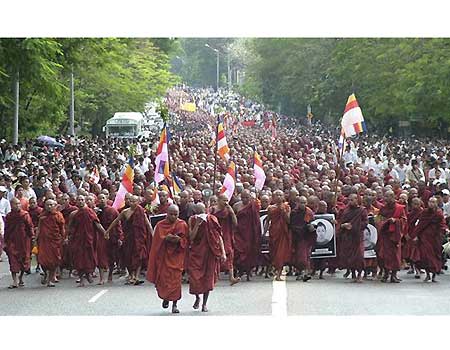
From Fox News: Myanmar Security Forces Open Fire on Protesters, Killing 9.
YANGON, Myanmar — Security forces fired automatic weapons into thousands of pro-democracy protesters for a second day Thursday, and the military government said nine people were killed and 11 wounded.Tens of thousands defied the ruling military junta's crackdown with a 10th straight day of demonstrations. Security forces also raided several monasteries overnight, beating monks and arresting more than 100, according to a monk at one monastery.
The protests were the stiffest challenge to the generals in two decades, a crisis that began Aug. 19 with protests over a fuel price hike and has drawn increasing international pressure on the isolated regime.
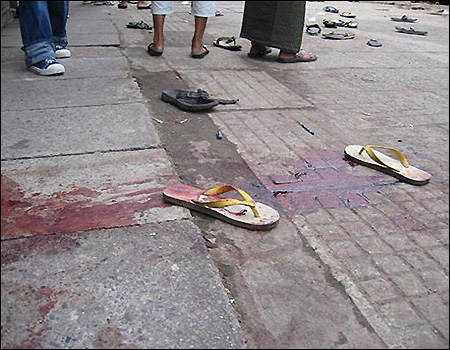
Rather more uplifting is proof that the people of Burma are not going to simply sit idly by while these events unfold. The mass media may yet be the undoing of the brutal and illegitimate regieme in Burma.
From the China Post: Internet, mobile phones aid Myanmar pro-democracy activists spread news.
OSLO, Norway -- Cell phones and the Internet are playing a crucial role in telling the world about Myanmar's pro-democracy protests, with video footage sometimes transmitted one frame at a time. Reporters Without Borders said the junta has cut some cell phone service.On the other side of the world in Oslo, a shoestring radio and television network called the Democratic Voice of Burma has been at the forefront of receiving and broadcasting such cyber dispatches by satellite TV and shortwave radio.
Chief editor Aye Chan Naing said the station, founded in 1992 by exiled Myanmar students, is able to pass on nearly real-time images and information about anti-government protests - unlike in 1988, when a similar uprising was shut down in a bloodbath that left more than 3,000 dead.
On Wednesday, the military opened fire after a month of mostly peaceful demonstrations by tens of thousands led by Buddhist monks, and the government confirmed at least one demonstrator killed and three wounded. Activists reported the death toll was five.
This time, the world has been watching through television and still images smuggled out of Myanmar over the Internet - sometimes, Naing said, one frame at a time. Dramatic images arrive via e-mails to exiled activists and via mobile phone calls to journalists outside the country, also known as Burma. Hundreds of images are simply posted on the Internet for anyone to see.
Those inside Myanmar receive information about the protests on shortwave radio broadcasts.
"This time, compared to 1988, there are lots of new technologies to get the news out of Burma ... People are able to take pictures, videos to evidence what is going on. It is quite amazing for Burma, which is a very poor country," said Vincent Brossel, director of the Asia desk for Reporters Without Borders. "Technology is the most useful weapon you can use in such types of pacifist struggles."
Aung Zaw, editor of the independent Irrawaddy Magazine in Thailand, said that in 1988, "it took days, sometimes weeks, even months" to get images out. "Now, it's so fast."
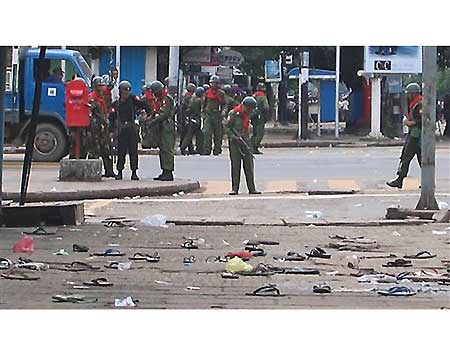
All Photos Copyright Associated Press, 2007.
Posted by: raging tachikoma at
05:17 PM
| No Comments
| Add Comment
Post contains 672 words, total size 5 kb.
When taking office any leader hopes fora honey moon period that will give him the time and political capital to acomplish some of their key aims, and in so doing generate more public support and momentum to keep pushing their agenda forward. Just how long the honey moony will last for the new Japanese prime minister Fukuda is hard to say. He may recieve the benefit6 pf the doubt and get several months. Or the public could keep him on a short leash and it might last a week or two. As of right now the indicators seem to be pointing toward a short honey moon for Fukuda.
From the Yomiuri Shimbun: Fukuda Cabinet approval rating at 58%
Prime Minister Yasuo Fukuda's newly formed Cabinet recorded an approval rating of 57.5 percent, according to a nationwide Yomiuri Shimbun survey.The telephone poll of 1,557 eligible voters, conducted Tuesday night through Wednesday, showed 27.3 percent of 926 people giving valid responses disapproved of the Cabinet.
Among those saying they approved of the Cabinet, most said they did so because they felt it had a "sense of stability."
The approval rating for the Fukuda Cabinet is the fourth highest recorded in a poll taken immediately after a cabinet has been formed, following the 87.1 percent recorded for Junichiro Koizumi, 71.9 percent for Morihiro Hosokawa and 70.3 percent for Shinzo Abe. Similar surveys have been conducted since the Cabinet of Masayoshi Ohira took office in December 1978.
While the poll numbers are promising they must be considered in the light that the recently departed abe started with even higher approval ratings that soon came crashing down to earth. With this sort of thing one just has to watch and wait.
Posted by: raging tachikoma at
03:39 PM
| No Comments
| Add Comment
Post contains 294 words, total size 2 kb.
September 23, 2007
As I noted here, my feelings about the upcoming meeting between President Roh and The Dear Leader are unchanged. The best outcome for this summit is that things remain as they are. At worst Roh screws up momumentally and gives the staggering regieme in the North a new lease on life. Roh's continual attemps at opening up the hermit kingdom have been a series of failures that have only given a mesure of undeserved legitimacy to the last of the Stalinist regiemes. Yet the preparations for the summit go forward despite political turmoil at home and rapidly fading support from the public.
From the Chosun Ilbo: Taking the Roh Moo-hyun Show to Pyongyang
By Kim Dae-joong,An old saying has it that you can only do well and exercise your power abroad if all is calm and peaceful at home -- a lesson that a person from a noisy and dysfunctional home can’t accomplish much in society. The same applies to a country. If the leadership puts the country into turmoil with corruption and fosters a society whose members feud and clash, it cannot expect to be treated well abroad, nor can they acquit themselves well. It's impossible for such a country to conduct proper diplomacy.
Many people watching President Roh Moo-hyun go to Pyongyang early in October will feel that way. A president with less than three months left in his tenure whose closest aides are being grilled by the authorities about corruption scandals; a politically sterile president devoid of a ruling party to lead, whose de-facto party is torn asunder: seeing such a president make a grand entrance in Pyongyang is rather pitiful.
How will he sit down face-to-face with a self-confident man used to absolute rule? Will he have the nerve to say what he should, and reject what he should, with dignity as the representative of South Korea? Will he be able to act as a bulwark for the South's security and peace, its leader in reality as well as in name? The public is uneasy about that.
Unfortunately, he keeps betraying public expectations. He ridiculed public hopes that the first point on the agenda of the inter-Korean summit should be the complete dismantling of North Korea’s nuclear facilities and weapons because that was like “provoking a quarrel.†That is incoherent babble from a person responsible for the security of the country.
Sadly it appears that President Roh is posessed of the same need for peace at any cost that animated the other apeasers of history like Chamblin and Daldier. His own words make it clear enough that he is far to willing to give up the farm for "peace" with a nation whose stated national policy is the destruction of the nation he leads.
From the Korea Herald: Glimpse into inter-Korean summit
With only 10 days left before the second inter-Korean summit Oct. 2-4, a rough picture of President Roh Moo-hyun's schedule for his visit to the North is taking shape.The president's schedule, which has always been highly confidential, is expected to be announced at the last moment. Roh's possible activities during the inter-Korean summit include watching the North's ultra-nationalistic Arirang Festival and visiting the Gaesong complex to encourage workers.
Unification Minister Lee Jae-joung said yesterday that Roh watching the Arirang performance together with North Korean leader Kim Jong-il could be a "message for peace to the world."
Peace huh? Just how is a nationalistic, jingo-istic anti-South Korean and anti-American display of total subversion to an oppresive regieme that starves its citizens while it spends what little it does have on A-bombs and luxuries for the elite. Sadly delusion and stupidity aren't checked at the door when one gains high political office. I would like to see this summit canceled in the wake of the revelations of what is going on in Syria, but that isn't likely to happen. All anyone can do now is hope that some one on his team will keep President Roh's head screwed on straight and keep him from treading on his three peice set with the old golf spikes.
Posted by: raging tachikoma at
10:57 PM
| No Comments
| Add Comment
Post contains 689 words, total size 5 kb.
Taiwan is in a bizarre situation, one that should never have happened. While I believe that preisdent Nixon was right in opening relations with the PRC, president Carter screwed the pooch by withdrawing US recognition of Taiwan for that of the PRC. The PRC should have been made to live with a two China policy wether they liked it or not. As far as I am concerned Taiwan, was and is a free, independent and sovergein nation state. The UN, for what little it is worth does offer a certain level of defacto legitimacy to it members. The general assembly, and the US and Japan in particular should be ashamed for not doing more to facilitate Taiwan's retun to the UN.
From the China Post on Taiwan's latest UN bid.
Taiwan's long march to re-join the United Nations has been most arduous, and there is no light at the end of the tunnel. On Wednesday, the United Nations spurned Taiwan's application for membership for the 15th time in as many years. The General Committee of the U.N. General Assembly deliberated behind closed doors on whether to put the application on the agenda of the 62nd General Assembly, which opened Tuesday. The decision against the application was made by "consensus," according to the Associated Press.
Ful Story: Long March to the United Nations
From a rather interesting letter to the Taipei Times.
What is the "status quo" in East Asia anyway? New democracies in Taiwan and South Korea, a Japan slowly normalizing in terms of foreign relations and defense, a North Korean basketcase fiddling with nuclear bombs and kidnapping foreign nationals, and a China that is growing economically and militarily in a rapid, unpredictable, and opaque fashion.The "status quo" is what anybody makes of it at any given time. It is hardly the basis for a foreign policy of a superpower with vital interests in the region.
US reservations about what is happening here are certainly understandable, as is its need for Chinese help in protecting Japan and South Korea from the regime in Pyongyang, but the US will find that it has been outmaneuvered by the "status quo" if it cannot come up with a more creative foreign policy than one that simply appeases Beijing.
Taiwanese political and economic development will be stunted and erratic so long as such fundamental questions regarding the sovereignty are kept "undecided" by the powers that have set themselves in judgement over Taiwan.
Read it all in the whole letter here.
From my position it seems simple enough that the US has a ready made excuse for serving relations with the PRC. Namely that the government of the PRC, never having recieved the just consent of the governed is, as a result illegitimate. Constrated with the freeely elected Goverment across the straits of Taiwan. If only someone with the power to do so would speek the truth and do the right thing. For the US to remain a credible supporter and creator of democratic nations it must stop giving recognition and assistance to non democratic regiemes.
Posted by: raging tachikoma at
10:38 PM
| No Comments
| Add Comment
Post contains 518 words, total size 4 kb.
I have made my choice, I am backing Fred Thompson for the 2008 Republican nomination. As long time Republican, like since I could vote, I feel like Fred has the best credidentials in all of the important categories, national security, second amendment rights and just general Reagn-esque conservatism. Sadly my home state of Kansas is not going to have a presidental primary, again. Not that it matters with everybody and their mother going for front loaded primaries in the first quarter of the year. Congress needs to step in and put in place a rotating, regioanl primary system that gives all members of each party a chance to shape their presidental ticket. Basically the sytem that has been proposed would have each quarter of the nation hold a primary one month apart over four months, rather than the all over the map primary sytem that we have now, with the starting region changing every presidental election cycle.
Oh yeah give money to Fred 08 or put up a donate button, or get a bumper sticker etc, you get the idea. ![]()
Posted by: raging tachikoma at
01:25 AM
| No Comments
| Add Comment
Post contains 191 words, total size 1 kb.
Yasuo Fukuda is to be the new Prime Minister of Japan, that comes as no great shock. He will face a difficult time in office, but hopefully he will be able to garner more public support than Abe managed.
From the Yomuiri Shimbun:
Former Chief Cabinet Secretary Yasuo Fukuda scored a comfortable victory in an election Sunday to succeed outgoing Prime Minister Shinzo Abe as president of the Liberal Democratic Party, which virtually guarantees that he will become the nation's next prime minister.
Fukuda wins LDP race / Will follow in footsteps of father as prime minister.
I don't envy the job facing Fukuda, but in the end he will likely carry out the same policies as Abe, and hopefully prove rather more adept at doing so. The first thing he needs to do is scrutinize his cabinet members very carefully. Continual scandals among Abe's cabinet was one of the prime reasons for his downfall.
Posted by: raging tachikoma at
01:16 AM
| No Comments
| Add Comment
Post contains 164 words, total size 1 kb.
September 21, 2007
Sometime ago you may remember that I put up a rambling and admittedly incoherent post about how the EU was bad for the UK's national defence, well this is a hopefully rather more readable take two.
I stand by the basic and simple premise that the UK must make a choice between being able to influence world events on her own militarily and as a result diplomatically or to subsume herself to being just one more cog in the defective European machine. The nature of the cosequences of making the wrong choice are readily observable and nearly came to pass twenty five years ago. The Falklands war proved that the UK was willing and capable of looking after her overseas interests without European assistance, of which none was forthcoming. The assistance she did receive however was from her one truly reliable ally, the United States. The help the US provided certainly helped swing the war in Britains favor, but in the end only the Brits themselves could go and take back what was rightfully theirs. A fine quote from Admiral Sandy Woodward's* book One Hundred Days bluntly warns of the dangers of excessive European integration and entanglements even before the UK became a member of the EU.
I can not resist a review of this whole affair. Were I Galtieri I would have observed the Malvinas** negotiations of the last few decades and found little hope of early staisfaction. I would have also observed that, over the same long period, there had been a progressive withdrawl of , and reduction in, British overseas military capability. In the General's boots, I would have concluded that at some time in the not so distant future, British policy on the Falklands issue would become all shadow and no substance.When the cuts in the Royal Navy were announced recently, the way ahead ust have seemed clear to Galtieri, and he only needed a half reasonable excuse. Senor Davidoff's scrap dealers and our indignant reaction to them provided just such an excuse. Galtieri attacked. His reasoning was as impeccable as his timing was previous. All he had to do was wait another six months, when Hermes, Invincible, Fearless and Intrepid would all have gone...
If the Argentinian government, or others similarly minded elsewhere, are to be deterred from this kind of military adventurism, we shall need to provide not only the mark of our resolution on the spot [a flag, a ship, a platoon]. But also the obvious wherewithal to reinforce it [mobile forces, at short readiness].
We would not again wish to repair our mistakes the hard way. But it was the last Defence Review that was a problem. After the needs of the strategic nuclear deterent and the defence of the home base had been met, they decided in favor of the short term, politically expedient, continental European commitment. This was to the detriment of Britain's long term, long established, worldwide, national interest. This was plainly evident to Galtieri, and I doubt he was alone.
Whatever I may have thought before, the Falklands experience has given me a new insight into the capacity of non-democratic governments for immorality and dishonesty. That capacity is apt to be too common in this turbulent world. What, if any, should Britain's role in all be in all of this? It is clear enough that our traditional global policy has long suited our geographic and political interests. That is a matter of history. And this war has once again demonstarted that it suits our professional military capability-air, land and sea.
Our Defence budget, of course can only buy a certain amount. But I am convinced that it ought to be spent where it can influence both European and World affairs. It must be a mistake to place it where it can affect - and in a very limited way at that - the policies of our European neighbors only.
The nature of the EU beast is vexingly complex and multifaceted, so much so that the definitive site on the EU, Richard North's EU Referendum has spawned a second blog just for defence issues, Defnce of the Realm check out these to great blogs and their forum for deep background and discussion on pretty much any EU related topic. As for the topic at hand the needs of Britains distant interests have not been well served by three sucessive governments, one Conservative and two Labour. They have invested heqavily in often inferior european made hardware that is available form others cheaper, with higher performance and a willingness to let the work be done by and large inside of the UK, creating jobs and the subsequent economic growth and wealth creation that it spurs, plus more tax revenue for the government. And some procurement projects that are quite frankly fiasocs of the first order, namely the Cougar Comand Liason Vehicle and the Eurofighter Typhoon, both of which are well nigh unuseable in the curent conflicts in Afghanistan and Iraq.
The fact is that today the UK would be hard presed to recapture the Flakland Islands, while they posess plenty of the major vessels needed for the task the sharp decline of Destroyers and Frigates in the Royal Navy would leave the Phibs and Flattops open to attack, not mention the nightmarishly long fleet train required in such distant waters. I have great personal respect for the drive and ingenuity of the individual British servicemember, but he has been let down continously since the early nineties by his Government and High Command in the name of European intergration, and sadly the cost has not just been wasted pounds and pence but caskets draped in the Union Jack. The choice is clear to everyone involved, but no one has the courage to do what must be done to save the military capability of the mother democracy. The people of the United Kingdom must speak loudly and with one voice, delivering a clear and concise message to their servants in Parliment that the UK free itself of the parsitic usurping European Union before it is too late.
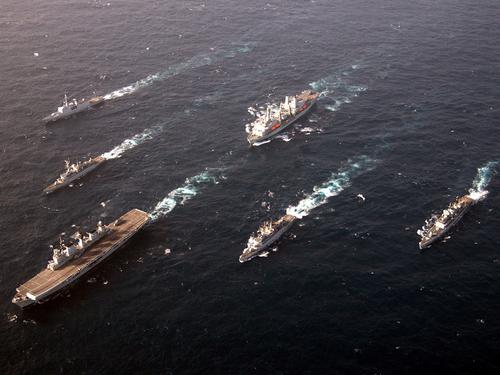
HMS Illustrious and her battle group underway in the Atlantic. Oficial MOD Photo
*Admiral Woodward commanded the British Task Force Charged with Recapturing the Falkland Islands and his account is a wounderful, engrossing, sometimes humorous and often touching read.
**The Argentinians call the Falkland Islands the Islas Malvinas.
Posted by: raging tachikoma at
03:17 PM
| No Comments
| Add Comment
Post contains 1060 words, total size 7 kb.
From the Yomuiri Shimbun:
Former Chief Cabinet Secretary Yasuo Fukuda and Liberal Democratic Party Secretary General Taro Aso, who are running in Sunday's LDP presidential race, both emphasized Friday the need to submit a bill on a new law to continue Japan's refueling mission in the Indian Ocean for U.S.-led antiterrorism operations in and around Afghanistan.The two candidates in the LDP presidential race to pick a successor to LDP President Shinzo Abe, the prime minister, held a debate forum at the Japan National Press Club in Chiyoda Ward, Tokyo, on the day.
The current Antiterrorism Law, which allows the Maritime Self-Defense Force to refuel U.S., British and other military vessels in the Indian Ocean, expires on Nov. 1.
Read the whole thing here: Fukuda, Aso urge new law on refueling / Say bill should be passed in current session.
So in the end the DPJ's intransagence may have toppled prime minister Abe but whoever succeeds him will ram through a renewal of the anti-terrorism law anyway. The DPJ gained a tactical victory but a strategic defeat, they hurt the LDP but did not, and can not prevent them from accomplishing their goal. In the end the outcome is the same, but the DPJ can claim that it forced concessions wether they did or not. (since the DPJ will likely regard the resignation of Abe as a form of concesion even though he could have gutted it out and pushed on ahead despite the resistance. So in the end nothing will signifigantly change in terms of policy at the top, at least as regards the war even though the players may change.
Posted by: raging tachikoma at
02:49 PM
| No Comments
| Add Comment
Post contains 276 words, total size 2 kb.
As you may have noticed things are changing rather quickly around here as mee.nu upgrades from Minx 1.0 to Minx 1.1. Please bear with me as I try to figure out how to get things as I want them and generally learn how the new model handles. Also sorry for the rather sparse postings over the last few days, I am going to try and make up for that with a number of posts over the next three days.
Addendum, from now on all internal links in posts will be Steel Blue and all outgoing links will be either Blue for work safe sights and Yellow for non work safe sights. All links in the sidebar will remain as they were previously
Addendum to the Addendum, Fresh From the Front links will remain Steel Blue.
Have an ecchi picture for your troubles. ![]()
Posted by: raging tachikoma at
11:10 AM
| No Comments
| Add Comment
Post contains 146 words, total size 1 kb.
September 10, 2007
Politicians as a group tend to be a rather slimy bunch, no matter what part of the world the hail from, so it is always nice to see one who is willing to stand on principle and do the right thing, even it were to mean the end of their career. So it is with Japanese prime Minister Abe as the following story and editorial from the Yomiuri Shimbun detail. Abe pledges to continue MSDF mission / Promises Bush he'll fight for refueling issue.(story) and Shirking the war on terror not an option.(editorial)
JDS Karuma, DDH-144
Posted by: raging tachikoma at
01:14 AM
| No Comments
| Add Comment
Post contains 104 words, total size 1 kb.
August 30, 2007
This is a good read, but I have to take issue with some of the analysis and pre-occupation with the UN. Still though go read it and tell me what you think.
Collective self-defense and collective security: what the differences mean for Japan.
Collective self-defense is authorized, along with individual self-defense, by Article 51 of the United Nations Charter. Put simply, if a country in the international system has suffered an armed attack, then any other country has the right, but not the duty, to use armed force against the aggressor in reliance upon the principle of collective self-defense.
The only preconditions, in addition to the determination that an armed attack has occurred or is irrevocably in motion, are that the use of force is deemed necessary, that the force is proportionate to that used in the attack or the threat posed, and that it is immediate.
What is crucial to recognize here, however, is that there is no requirement that the U.N. Security Council make any prior determinations, much less authorize the use of force. Thus, if Canada were to launch an armed attack against the United States, to take a far-fetched hypothetical example, and Japan was permitted under its constitution to exercise the right of collective self-defense, then it could use force against Canada under international law (regardless of whether Japan had a mutual security treaty with the U.S.).
So long as the Japanese government itself came to the conclusion that the U.S. had indeed been the victim of an armed attack, Japan would be free to use force against Canada in reliance on collective self-defense (though the Security Council or the International Court of Justice could subsequently find that the use of force was unjustified, as happened to the U.S. in the case Nicaragua v. The United States of America).
In contrast, collective security involves the use of force to maintain or restore international peace and security, as authorized by the U.N. Security Council under Chapter VII, and specifically Article 42, of the U.N. Charter. There need be no "armed attack" as a conditional precedent, but merely a determination by the Security Council that there is a threat to the peace, a breach of the peace, or an act of aggression, such that the use of force or other measures are required to maintain or restore international peace and security.
So the scope of collective security operations is much broader and the threshold for its use much lower, than for collective self-defense; but states may not act unilaterally, singly or together, under the guise of collective security. Authorization by the U.N. Security Council is necessary.
The continuing debate both within and outside of Japan as to her future role militarily in the world is slowly but surely beginning to gather momentum. While many of her neighbors and more than a few of her own citizens would like to continue Japan's reliance upon others for her security it becomes ever more obvious that this can no longer be the case. The author of this piece misses what is really one of they key facts in the modern world, that institutions like the UN aren't worth the price of the paper their charters are written on. After all what exactly an amended article nine does or doesn't allow for is entirely dependant upon the interpritation of the then current Japanese government. That is the key issue here, not what the constitution says but what the government believes it says. Words are open to differing interpritations, and those interpritations often play a large part in crafting what actions the Japanese government does and does not take. The author is confusing the words of document of no worth, the UN charter with that of tremendous worth and importance, the costitution of a sovereign nation. Even the oldest and most straight forward of political documents must be interpritated to apply them to the modern world. One of the primary duties of the US Supreme court is to provide guidance and interpritation of the US Constitution when the meaning of an article or amendment is at controversy. The real world has a nasty way of making the utopian ideals of the past and present reveal themsleves for the terrible and misguided things that they are. How you interpret the words of a constitution can allow you to do things that are completely contridictory to the clear meaning of the words contained there in.
If I maybe be a bit unrealistic here for a moment but the Japanese could in theory take action against the taliban and al qaeda since Japanese nationals were killed in the attack on the twin towers. This could be justified by simply taking the position that an attack upon a nation's citizens by a foriegn power is an ipso facto attack upon the nation as a whole. Article nine as it now exsists forbids the use of war and the right of beligerency, but this can be avoided by using a term other than war to descibe what is in effect war. After all according to the Truman administration there wasn't a war in Korea but rather a Police Action.
For the record her is the exact wording of article nine as it is now, quoted from Wikipedia: (quoted sections in blue)
ARTICLE 9. Aspiring sincerely to an international peace based on justice and order, the Japanese people forever renounce war as a sovereign right of the nation and the threat or use of force as means of settling international disputes.And to effect this it is furthered by section 2 which forbids the posession of a military.
In order to accomplish the aim of the preceding paragraph, land, sea, and air forces, as well as other war potential, will never be maintained. The right of belligerency of the state will not be recognized.
From a strictly legal point of view the Japanese goverment has been in violation of section 2 of the article since 1949, but have avoided that issue by deft symantic footwork. If symantics can allow for the poseesion of a military without removing article nine then I see no reason to see why it can't allow for their use as it stands now. Still the need to amend or remove article nine is needed if simply to remove any calls of hypocracy when Japan makes use of her military power. It needs to be said that should it come down to it the Japanese would make use of their military regardless of what article nine does or doesn't say if the survival of the nation depended upon it. The most likely case for this is in the event of a North Korean invasion of South Korea, which would include strikes at US forces in Japan and as a result attacks upon Japanese forces the share facilities with and given the poor quality if the NK's weaponry the Japanese populace at large. No nation can afford to ignore such a provocation if it wishes to remain a credible power in the eyes of her own citizens and the world. The final analysis is that Japan should simply accept that article nine and other vestiges of high minded world peace idealism were a bad idea when they were included in the postwar conctitution and are even more dangerous and damaging in the unsettled world that she now finds herself residing in.
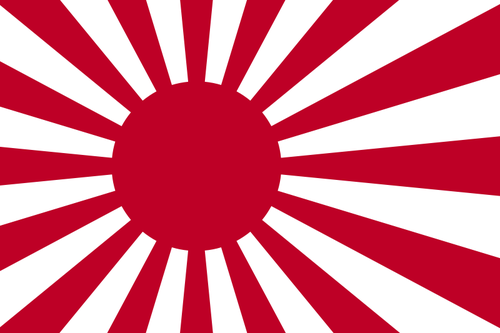
Posted by: raging tachikoma at
06:41 PM
| No Comments
| Add Comment
Post contains 1243 words, total size 8 kb.
33 queries taking 0.025 seconds, 99 records returned.
Powered by Minx 1.1.6c-pink.









